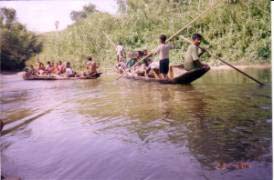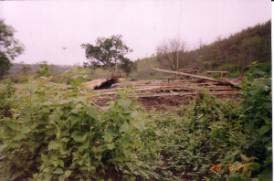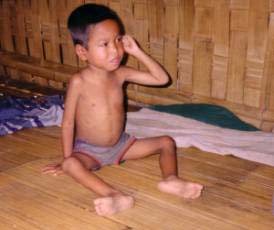FREE
BURMA RANGERS
HUMANITARIAN RELIEF MISSION
ARAKAN/CHIN STATES – APRIL 2004

Arakan IDPs fleeing in boats

Burned home in Arakan State

Sick IDP child
1. Women's rights in Arakan State.
In the Arakan area, some women live in tragic conditions, faced with many abuses
of their rights. It is reported that in the majority of villages, from 1993-2004,
many Arakanese women have been forced to marry Burma Army soldiers. This seems
to be a policy of the military regime and the team reported that in comparative
worth, "one Arakan lady is more powerful than a rocket launcher" (in
terms of providing information to the soldiers they are married to). Many women
are left alone because their Burma Army husbands moved to other camps. These camps
will not take responsibility for the wives and children. Moreover, the Burma Army
soldiers often remarry when they arrive at a new camp. Cases of abuse by the soldiers
against Arakan women have also been reported.
2. Looting and Forced Portering
Every month, each village must send two kilograms or more of meat to the military
camp nearby. The villagers are also forced to porter and carry the food and equipment
of the Burma Army soldiers. They are also forced to work at the military camps
and are not compensated.
3. Watchman for the post at the countryside areas
In the countryside, the military orders villagers to deliver mail and to take
turns waiting at camps for mail runs.
4. Religion in Arakan areas
The military junta does not grant freedom of religion. For example, most people
in the regime are Buddhist, so believers of other faiths are oppressed by the
military in the government departments, in the military camps and in every part
of the regime. In the military ranks and government offices, Buddhists have a
higher opportunity to be promoted. (The FBR team making this report is Buddhist.)
It is noted, though, that monks and the Buddhist Sangha are also closely watched
by the authorities.
5. Feelings of the Arakan IDPs
The Free Burma Rangers (Arakan Relief Team) visited Arakanese IDPs in order to
assess their condition. The IDPs feel hopeless, helpless and uncared for by international
governments and NGOs. Now, the IDPs are worrying daily for food during this rainy
season because in their area the rice prices are increasing every day. The IDPs
do not have any idea of how to maintain a good standard of living because they
have no work. The IDPs are only depending on the mountains to produce paddy in
hiding places and are also praying for help.
6. Health of Arakanese IDPs
The health situation among IDPs is unfortunate. Some IDPs die of simple diseases
that are easily treatable. However, it is difficult to get medicine and they struggle
to find enough food to survive. Some women die in childbirth. Some of the IDPs
hope of getting emergency medical care and the Arakan FBR team hopes for the help
of international governments and NGOs.
7. Education in Arakan State
Thousands of IDP children have no schools to attend. Near Triangle, there is an
IDP school that has funding now, but soon that will change and they will have
difficulty staying open. The school lacks teaching aids, notebooks and other school
supplies.
8. INTERVIEWS
Name: XXX XXX
Age: 25
Village: Kyaun Ton Village, Palawa Township, Arakan State, Burma
Occupation: Soldier
Marital Status: Single
XXX XXXX fled from Burma Army Battalion 55, located at Capali Island. He became
a soldier because he had gone to Bangladesh for two months and upon returning
to his village he was arrested at the Ta Raw Li camp. While in custody, a Captain
asked him to pay 10,000 Kyats or join the military. He didn't have enough cash
so he was forced to join the Burma Army.
He ran away from Mari Wa Camp on March 12, 2004 due to racial discrimination.
There was only one other Arakanese soldier, most of the others are Burman in Mari
Wa Camp, a border security camp near the India. He says that his Captain did not
issue him a gun because he was Arakanese. He was given a gun when he was on sentry,
but he observed that all of the Burman soldiers had their guns all the time. He
was not allowed to leave the camp, but all of the Burman soldiers were allowed
to leave the camp and watch movies.
His Captain forced him to carry bamboo and supplies. He was paid very little.
He fled to the Arakan Liberation Party with one G-3 and 200 bullets.
Name: XXX XXX
Age: 47
Village: Kyun Ton Village, Palawa Township, Arakan State, Burma.
Occupation: Cutting bamboo and farming
Marital Status: Married with 4 sons and 4 daughters
XXX XXX was forced to search for his son (see interview above) who escaped from
his military camp (Burma Army Battalion 55). Burma Army Battalion 33 forced XXX
XXX to come to their camp, they asked about his son and searched XXX XXX. XXX
XXX was afraid of being arrested, so he left his village and fled to India. XXX
XXX is worried for his family now.
9. Narcotics in Arakan State
At the moment, drug traffickers have become more interested in the Arakan area,
and the FBR Arakan team report that they plan to use the Arakan, as well as Chin,
areas to export drugs such as heroin, opium, and amphetamine tablets. These drugs
come from the eastern part of Burma and go through to Bangladesh and India. Drug
dealers are interested in Bangladesh because it seems easier to export the drugs
through Bangladesh to the international drug markets. According to reports from
the area the team traveled to, last month about five kilograms of heroin came
through Chittagong Hill Street, originally coming through Palawa Township. Also
reported was 100 kilograms of heroin coming from the Chinese border, but there
were no other details. At the time of the mission, the opium farmers near Labawa
military camp had already finished harvesting their opium crops.
10. The Gas Pipeline survey in Arakan State
Gas was discovered in the Bay of Arakan, 30 miles west of Manaung Islam Township
(Block Number A1). Between 13.4 trillion cubic feet and 47.3 TCF. The gas was
discovered by LTD Daewoo International (South Korean based company). The gas was
found in August 2003 (Daewoo International signed an exploration contract for
the block with Myanma Oil and Gas Enterprise, under the Ministry of Energy, in
2000). Companies that are cooperating with Daewoo are the Oil and Natural Gas
Corporation of India Videsh Limited (ONGC), the Gas Authority of India Limited
(GAIL), and Korean Gas Corporation (KOGAS). The percentage of investment is as
follows; Daewoo 60%, ONGC 20%, GALL 10%, and KOGAS 10%. At present the capacity
to produce is 6 trillion cubic tons. The plan is to export 2 trillion cubic tons
to India (planned for 2006-2007). The areas that the gas pipeline will cross are
believed to be Manaung, Mrepon, Manpra, Mouk Oo, Kyauk Taw and Palawa Townships.


